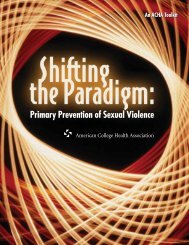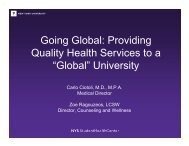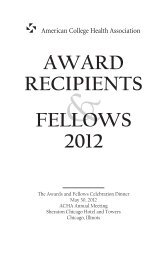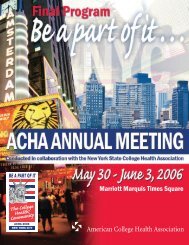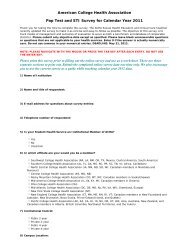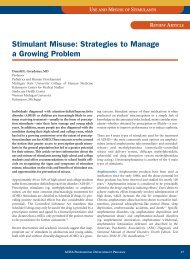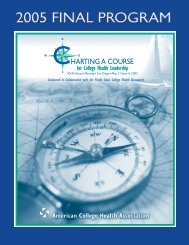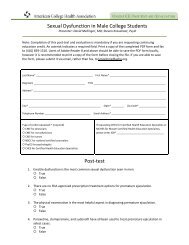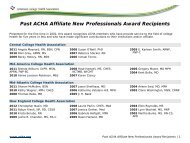Final Program [5.4MB pdf] - American College Health Association
Final Program [5.4MB pdf] - American College Health Association
Final Program [5.4MB pdf] - American College Health Association
- No tags were found...
Create successful ePaper yourself
Turn your PDF publications into a flip-book with our unique Google optimized e-Paper software.
Partners Under the PalmsSCHEDULE OF PROGRAMS AND EVENTSTHURSDAY General Sessions10:00 AM - 11:30 AM (cont.)53 TH233. Update 2008: TargetedTesting for Tuberculosis in <strong>College</strong> andUniversity StudentsRoom: Crystal G2CME:1.5 AAFP-P:1.5 CH:1.5 CECH:1.5 PsyCE:0 NBCC:0 PhCE:0The attendee should be able to:1. Describe the goals and charge of the TBGuidelines Task Force.2. Differentiate between public health goalsand personal health care in targetedtesting for TB.3. Discuss new TB screening blood tests(QFT-G).4. Discuss the newly revised ACHA TBGuidelines Statement.Presenter(s): Andrew Vernon, MD, MHS (Centersfor Disease Control and Prevention)Presider: John Dorman, MD (StanfordUniversity)Facilitator: Ann Nadler, MA (University ofMissouri-Columbia)1:45 PM - 3:15 PM54 TH009. Performance EnhancingSubstances in <strong>College</strong> AthletesRoom: Crystal A & BCME:1.5 AAFP-P:1.5 CH:1.5 CECH:1.5 PsyCE:1.5 NBCC:1.5PhCE:1.5 contact hours (program no. 067-999-08-011-L01-P)The attendee should be able to:1. List the most commonly used ergogenicsubstances.2. Identify the biological, performanceenhancing,and potential side effects ofsuch substances.3. Describe the points to include in counselingstudent athletes about healthyalternatives to these substances.4. Describe different strategies for controllingdrug use in athletes, using bothcognitive-based and behavioral-basedapproaches.Presenter(s): James MacDonald, MD (Universityof California-Santa Cruz and Children’s HospitalBoston)Presider: Chris Henderson, BSPharm(Dartmouth Univeristy)Facilitator: Kimberly Spading, BSPharm(University of Iowa)55 TH041. Working with Troubled 2. Identify concerns related to the integrationof health and counseling centers.Students: Reflections of Campus Tragedies,Clinical, and Administrative Issues3. Discuss collected data and the nextRoom: Sagosteps of the task force, including theCME:1.5 AAFP-P:1.5 CH:1.5 CECH:1.5 PsyCE:1.5 NBCC:1.5 collection of qualitative data that willPhCE:0form the basis of case studies in theThe attendee should be able to:white paper.Presenter(s): Keith Anderson, PhD (Rensselaer1. Explain issues related to troubledPolytechnic Institute); Joy Himmel, PsyD, APRNstudents and relevant recommendationsBC, LPC, NCC (Pennsylvania State Universityofvarious Virginia Tech panels.Altoona); Joy Wyatt, PhD (Case Western2. Discuss clinical responses to troubled Reserve University); Jamie Davidson, PhDstudents.(University of Nevada-Las Vegas)3. Identify key administrative issues in Presider: Drayton Vincent, MSW (Louisianadealing with troubled students.State University)Presenter(s): Gregory Eells, PhD (CornellFacilitator: Karen Brule (Williams <strong>College</strong>)University)58Presider: Joetta Carr, PhD (Western MichiganTH087. Medical Grand RoundsUniversity)Room: Crystal J1Facilitator: Alan Barnes, MDCM (University of CME:1.5 AAFP-P:1.5 CH:1.5 CECH:0 PsyCE:0 NBCC:0 PhCE:0Florida)The attendee should be able to:561. Describe a differential diagnosis basedTH068. How to Publish in theJournal of <strong>American</strong> <strong>College</strong> <strong>Health</strong>on limited information.2. Discuss the appropriateness of laboratorytesting, imaging, or consultation inRoom: Crystal M & NCME:1.5 AAFP-P:0 CH:1.5 CECH:1.5 PsyCE:1.5 NBCC:1.5PhCE:0these cases.3. Describe the likelihood of disease basedThe attendee should be able to:on the risk status and ethnicity (if1. Discuss writing tips for getting publishedin any scientific publication. Presenter(s): John Dorman, MD (Stanfordrelevant) of the patient.2. Describe the process by which JACH University)manuscripts are submitted and reviewed Presider: Brooke Durland, MD (Rochesterin Manuscript Central.Institute of Technology)3. Define the most common shortcomings Facilitator: Theresa Stephan Hains, MD (BuffaloState <strong>College</strong>)of routine journal submissions to theJACH and how to avoid them.59 TH103. HIV: <strong>College</strong> Prevalence,Presenter(s): Reginald Fennell, PhD, CHES Barriers to Testing, and the Continued(Miami University); Deanna Lowery (Heldref Importance of PreventionPublishing Company); Peggy Veeser, EdD, APRN, Room: Crystal P & QBC, FACHA, FAANP (University of Tennessee);CME:1.5 AAFP-P:1.5 CH:1.5 CECH:1.5 PsyCE:0 NBCC:0 PhCE:0Ted Grace, MD, MPH (The Ohio StateThe attendee should be able to:University)1. Describe the prevalence of HIV infectionPresider: Peggy Veeser, EdD, APRN, BC, FACHA,FAANP (University of Tennessee)in the college population.2. Describe barriers to HIV testing.57 TH079. Mental <strong>Health</strong> Best Practices 3. Explain the CDC Advisory for routineTask Force: Exploring the Integration of testing.<strong>Health</strong> and Counseling CentersPresenter(s): Michael Deichen, MD and PeterRoom: Crystal J2Mastroianni, MA (University of Central Florida);CME:1.5 AAFP-P:1.5 CH:1.5 CECH:1.5 PsyCE:1.5 NBCC:1.5 Cathy Robinson-Pickett (Florida SouthernPhCE:0<strong>College</strong>)Presider: Karen Yerkes, MA, ARNP (University ofThe attendee should be able to:Florida)1. Describe goals and objectives of the taskFacilitator: Evi Dresser, RN, MSN, FNPforce.(University of California-Los Angeles)www.acha.org/AnnualMeeting08<strong>Final</strong> <strong>Program</strong>43


![Final Program [5.4MB pdf] - American College Health Association](https://img.yumpu.com/49022356/43/500x640/final-program-54mb-pdf-american-college-health-association.jpg)
